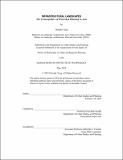Infrastructural Landscapes: The Technopolitics of Watershed Planning in Asia
Author(s)
Tang, Dorothy
DownloadThesis PDF (38.38Mb)
Advisor
Ben-Joseph, Eran
Terms of use
Metadata
Show full item recordAbstract
This three-essay dissertation examines the technopolitics of watershed management in shaping infrastructure and landscapes in Asia. Technopolitics describes the co-production of power and technologies and how these processes manifest in the physical and social world. Using this conceptual framework, each essay analyzes a different watershed rationale, to understand how the politics of infrastructure restructure urban processes, development, and governance.
Essay 1 analyzes China’s Sponge City movement and how stormwater management produces uneven development in Guangzhou and Shenzhen. Examining the role of green infrastructure technologies in mediating central mandates and local enforcement, I found that the technological basis of runoff standards at the national level shapes implementation strategies of local governments. While a systematic watershed approach is most ecologically effective, a fragmented parcelized approach is easier to quantify, faster to implement, and conducive to private financing. Thus, local officials turn to neoliberal urban development to meet the central government’s environmental goals instead of prioritizing ecological performance.
Essay 2 studies how geopolitics and water security shaped colonial Hong Kong’s transboundary freshwater infrastructure. Through two major water emergencies in the 1960s, I illustrate how uncertainty over Hong Kong’s sovereignty during the Cold War produced competing freshwater infrastructure systems: reservoirs for water autonomy and aqueducts for integration with Mainland China. Moreover, the ecological impact of reservoir construction forced the British colonial government to temporarily include saline water in the freshwater supply, exacerbating a crisis of governance in 1967. This colonial legacy of freshwater provision continues to influence contemporary debates over self-sufficiency and integration in its environmental politics and land supply controversies.
Essay 3 examines transnational infrastructure projects in the Mekong River Basin and the promise of regional infrastructure for economic development. I trace the history of transnational planning of the Mekong Project (1957-75) and the Greater Mekong Subregion Economic Corridors (1992-), to understand how planned infrastructure projects shape regional politics. The imaginary of the Mekong Region began with the functional region of a watershed and evolved into an economic region of linear corridors. Both plans remain largely unbuilt, but its political work endures in the regional dynamics and developmental ambitions of Mekong riparian nations.
Date issued
2022-05Department
Massachusetts Institute of Technology. Department of Urban Studies and PlanningPublisher
Massachusetts Institute of Technology